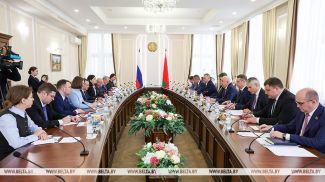MINSK, 5 April (BelTA) – Belarus will continue to export beef to Russia, BelTA learned from Aleksei Bogdanov, Head of the Central Office for Foreign Economic Activities of the Belarusian Agriculture and Food Ministry.
The Federal Service for Veterinary and Phytosanitary Surveillance of Russia has introduced temporary restrictions on import of cattle from countries which do not have an official spongiform encephalopathy status of the World Organization for Animal Health (OIE). “This restriction applies not only to Belarus, but all other countries without this status. However, there is no need to worry as there have never been registered cases of spongiform encephalopathy in Belarus. The OIE has special rules which define certain methods to prove this. Belarus uses a hystochemical method instead of the immunological one. We have been working to switch to another method for a long time and have already developed a corresponding state program. Regional veterinary laboratories should be furnished with the necessary equipment and supplied with certain chemical agents. Several regional laboratories have already finished this process, with the others going through the last stage. This year we will start taking marrow samples from animals to monitor this disease in Belarus,” Aleksei Bogdanov said.
Belarus' beef export to Russia consisted primarily of boned meat (70%) with the rest being separated meat. “Russia's new import rules applies only to boned meat, so we may continue exporting separated meat. This is even more profitable for us because we will manufacture end products and export chilled or frozen meat. We will be able to create jobs, increase the production of separated meat and export it to Russia at a higher price. The demand for beef remains the same, only the supply scheme will change. There may be minor issues in the beginning, because manufacturers will have to amend the production process and work somewhat differently but this will not present a problem,” Aleksei Bogdanov added.













